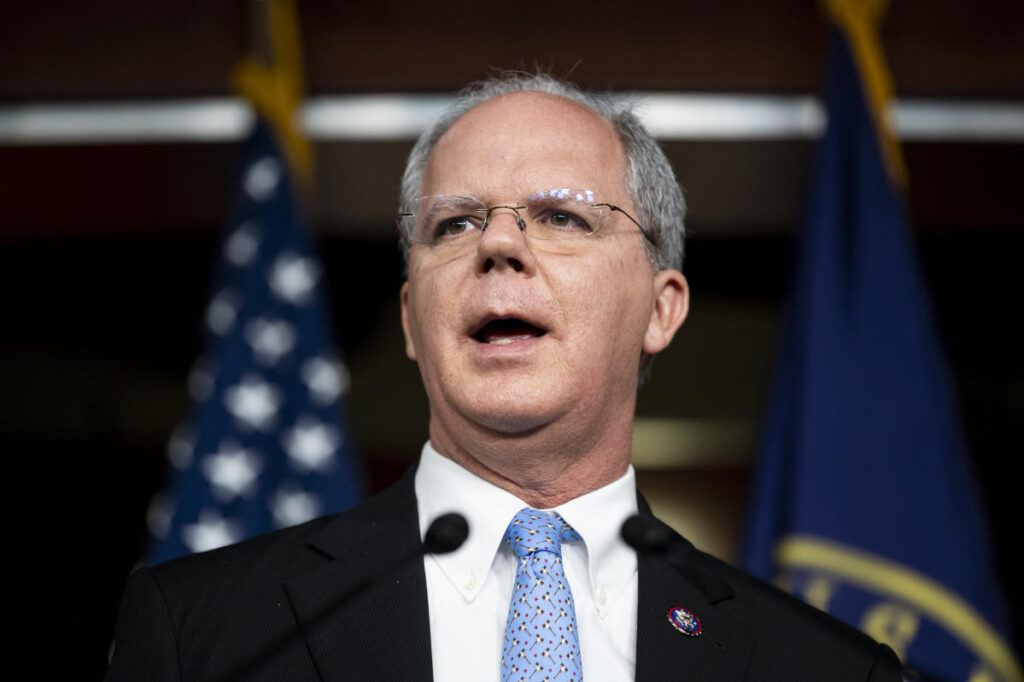House Republicans are eyeing tariff revenue, clawbacks of clean energy incentives and savings from President Donald Trump’s Department of Government Efficiency as potential alternatives to the steep Medicaid cuts they’re considering as part of their sweeping domestic policy package, according to three people familiar with the conversations.
It’s not likely to be enough.
The search for a Plan B comes as GOP leaders scramble to assuage vulnerable lawmakers’ concerns ahead of a planned Tuesday vote. The fiscal blueprint Republicans are teeing up for floor action targets $2 trillion in spending reductions in their massive Trump agenda bill, and swing-district members are nervous about the potential impact on safety-net programs their constituents rely on.
Speaker Mike Johnson and other leaders are seriously exploring whether tariff revenue and DOGE savings can largely cover the extra $500 billion in spending cuts that the House Freedom Caucus negotiated earlier this month as the blueprint moved through the House Budget Committee, according to the three people.
The alternatives are controversial: Because Trump’s tariffs have so far been levied by presidential fiat, not by Congress, many Hill Republicans don’t believe they can be counted as a legitimate spending offset. And it remains to be seen whether the DOGE cuts, many of which are now subject to court challenges, can notch the level of savings some in the GOP have claimed.
Separately, Republicans are looking for additional energy policy moves that would general fiscal headroom within the House Energy and Commerce Committee’s jurisdiction. That panel is expected to deliver at least $880 billion in savings over the coming decade, with the bulk of those cuts likely coming from Medicaid.
Lawmakers are already planning on enacting new work requirements for the program and closing state loopholes, along other changes. Some Republican skeptics are also open to decreasing the percentage of Medicaid costs that the federal government pays for.
One of those skeptics, Rep. Nicole Malliotakis of New York, said Monday that Johnson assured her that benefits wouldn’t be cut for those who comply with the work requirements and who are confirmed to be U.S. citizens. She added that she and others are awaiting a presentation on alternatives from Energy and Commerce Chair Brett Guthrie (R-Ky.) that would “make us feel much more comfortable.”
GOP leaders have been assuring a group of worried Republicans that they’ll focus on “waste, fraud and abuse” within the program and not cut benefits. But there are fears that lawmakers won’t be able to reach the $880 billion threshold without cutting deeply into program benefits — which is why Republicans are furiously scrambling for any plausible alternatives.
“We absolutely are in favor of cutting some of the waste, fraud and abuse that is rampant throughout our government,” Rep. Tony Gonzales (R-Texas) said upon leaving one meeting with Johnson Monday evening. “But how do you do that without hurting hard-working Americans? That’s the balancing act.”
Johnson and other leaders indicated in the private meetings that they still plan to hold a vote Tuesday evening, according to four Republicans familiar with the conversations. But that hinges on Johnson convincing at least a dozen holdouts to support the measure.
“If I don’t get answers, I won’t vote for it,” Malliotakis said.
Asked after the meetings if the vote would proceed Tuesday as planned, Johnson said, “We’ll see.”
Guthrie has floated a number of non-Medicaid related options as potential offsets, including repealing climate initiatives and electric vehicle incentives enacted under President Joe Biden. Guthrie has also said that a major Biden administration effort to expand access to broadband internet — the Broadband Equity, Access and Deployment Program — needs an examination.
He’s also suggested that expanding commercial access to wireless technology spectrum through an auction could be on the table. Senate Commerce Chair Ted Cruz (R-Texas) has pushed a similar plan that could net $100 billion in revenue from companies looking to expand wireless technology.
Johnson insisted Monday that Medicaid isn’t mentioned in the budget resolution he is planning to put up for a vote this week.
That is true, but lawmakers continue to fear cuts to the program will become inevitable given the scale of the savings expected out of Energy and Commerce. Trump has said Medicare and Social Security won’t be touched, leaving Medicaid as the largest potential pool of savings. Trump has left the door open to curbing “waste” in the program — a term that is open to interpretation.
Members are also concerned about the $230 billion in cuts expected out of the House Agriculture Committee, which would likely mean cutting current food aid benefits delivered through the country’s largest anti-hunger program.
Senior Republicans have privately told concerned members that the Senate will ultimately temper any cuts targeting both Medicaid and food benefits.
Read the full article here


